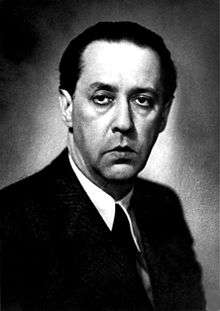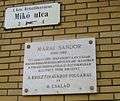Sándor Márai
| Sándor Márai | |
|---|---|
 Sándor Márai | |
| Born |
April 11, 1900 Kassa (Košice), Kingdom of Hungary, Austria-Hungary |
| Died |
February 21, 1989 (aged 88) San Diego, United States |
| Occupation | Writer |
| Language | Hungarian |
| Nationality | Hungarian |
| Notable awards | Kossuth Prize (in memoriam) |
| Spouse | Ilona Matzner |
Sándor Márai (originally Sándor Károly Henrik Grosschmied de Mára, archaically English: Alexander Márai;[1] 11 April 1900 – 21 February 1989) was a Hungarian writer and journalist.
Biography
He was born in 1900 on April 11 in the city of Kassa, Hungary (now Košice, Slovakia). Through his father, he was a relative of the Hungarian noble Országh family. In his early years, Márai travelled to and lived in Frankfurt, Berlin, and Paris and briefly considered writing in German, but eventually chose his mother language, Hungarian, for his writings. In Egy polgár vallomásai, Márai identifies the mother tongue language with the concept of nation itself.[2] He settled in Krisztinaváros, Budapest, in 1928. In the 1930s, he gained prominence with a precise and clear realist style. He was the first person to write reviews of the work of Franz Kafka.
He wrote very enthusiastically about the First and Second Vienna Awards, in which Germany forced Czechoslovakia and Romania to give back part of the territories which Hungary lost in the Treaty of Trianon. Nevertheless, Márai was highly critical of the Nazis.
Marai authored 46 books. His 1942 book Embers (Hungarian title: A gyertyák csonkig égnek, meaning "The Candles Burn Down to the Stump") expresses a nostalgia for the bygone multi-ethnic, multicultural society of the Austro-Hungarian Empire, reminiscent of the works of Joseph Roth. In 2006 an adaptation of this novel for the stage, written by Christopher Hampton, was performed in London.[3]
He also disliked the communist regime that seized power after World War II, and left – or was driven away – in 1948. After living for some time in Italy, Márai settled in the city of San Diego, in the United States. Márai joined with Radio Free Europe between 1951-1968.[4]Márai was extremely disappointed in the Western powers for not helping the Hungarian Revolution of 1956.[5]
He continued to write in his native language, but was not published in English until the mid-1990s. Like other memoirs by Hungarian writers and statesmen, it was first published in the West, because it could not be published in the Hungary of the post-1956 Kadar era. The English version of the memoir was published posthumously in 1996. After his wife died in 1986, Márai retreated more and more into isolation. In 1987, he lived with advanced cancer and his depression worsened when he lost his adopted son, John. He ended his life[6] with a gunshot to his head in San Diego in 1989. He left behind three granddaughters; Lisa, Sarah and Jennifer Márai.
Largely forgotten outside of Hungary, his work (consisting of poems, novels, and diaries) has only been recently "rediscovered" and republished in French (starting in 1992), Polish, Catalan, Italian, English, German, Spanish, Portuguese, Czech, Slovak, Danish, Icelandic, Korean, Dutch, Urdu and other languages too, and is now considered to be part of the European Twentieth Century literary canon.
Bibliography
Translated into English
- The Rebels (1930, published in English in 2007), Hungarian title: A zendülők. ISBN 0-375-40757-X
- Esther's Inheritance (1939, published in English in 2008), Hungarian title: Eszter hagyatéka. ISBN 1-4000-4500-2
- Casanova in Bolzano (1940, published in English in 2004), Hungarian title: Vendégjáték Bolzanóban ISBN 0-375-71296-8
- Portraits of a Marriage (1941 & 1980, published in English in 2011), Hungarian titles: Az igazi (1941) and Judit... és az utóhang (1980) ISBN 978-1-4000-9667-1
- Embers (1942, published in English in 2001), Hungarian title: A gyertyák csonkig égnek. ISBN 0-375-70742-5
- Memoir of Hungary (1971, published in English in 2001), Hungarian title: Föld, föld...! ISBN 963-9241-10-5
- The Withering World: Selected Poems by Sandor Marai (Translations by John M. Ridland and Peter V. Czipott of 163 poems, published in English in 2013) ISBN 978-1-84749-331-6
Gallery
 Statue of Márai
Statue of Márai
in Košice Márai's place of residence (today's Mäsiarska Street in Košice)
Márai's place of residence (today's Mäsiarska Street in Košice)
 Márai's signature
Márai's signature
(detail of his statue in Košice)
 Márai's memorial on his former home in Krisztinaváros
Márai's memorial on his former home in Krisztinaváros
Notes
- ↑ Leslie Konnyu: Modern Magyar literature: a literary survey and anthology of the xxth century Hungarian authors -PAGE: 95 , Publisher: American Hungarian Review, 1964
- ↑ Márai, Sándor. "Egy polgár vallomásai." Akadémiai Kiadó, Budapest, 1935.
- ↑ Billington, Michael (March 2, 2006). "Embers". Guardian Unlimited. Retrieved 2007-09-10.
- ↑ Márai, Sándor
- ↑ The Life of Sándor Márai
- ↑ "Sándor Márai". Random House. Retrieved June 3, 2009.
External links
| Wikimedia Commons has media related to Sándor Márai. |
- Official Marai site at Knopf, which is releasing Marai's novels in English
- Review of Embers
- Marai's American Journal – Excerpts (in English) from Marai's final diaries,
- Sándor Márai Blog – a fan blog with news, reviews, links
- Márai at Hunlit
- János Kőbányai,Sándor Márai: a smoldering within,"Eretz Acheret" Magazine
- 70 Years Later, A New Chance To Read 'Marriage' NPR story about new translation of "Portraits of A Marriage" (with link to excerpt)
